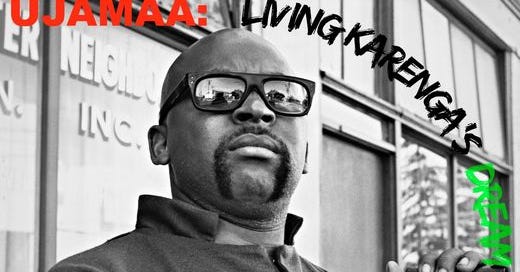Ujamaa: Living Karenga's Dream
Why does the fourth day of Kwanzaa sound like a communist manifesto?
I miss Ujamaa.
Ujamaa has become the most complicated of the seven principles to sustain. Why? Well, because it conflicts with how most people feel the world ought to work.
Let me explain.
Ujamaa means Cooperative Economics, and the way Dr. Karenga (the founder of Kwanzaa) explains it, it means to build and maintain our own stores, shops, and other businesses and to profit from them together.
And in case you're wondering, "OUR" meant people of African descent living in dire straits in the States.
Sounds essentially Socialist, right? The same kinda thing that spelled doom for the bloodlines of the Russian Czar and the Chinese Emperor. There's nothing capitalistic about it. It goes against everything America has indoctrinated into us Americans.
It's damn near the Anti-American Dream.
I wasn't an adult when I first encountered Ujamaa. I was a wee lad. And while I did grow up in America, exposed to ample amounts of the same propaganda-plagued media as every other American, I spent every day under the tutelage of adults who rejected that propaganda (for obvious reasons), many of whom had made it their purpose in life to indoctrinate me against what was being presented to me at every turn as the ideal.
So, in that respect, I didn't grow up immersed in the American Dream. I grew up in a fairly sequestered state where Dr. Karenga's Dream was the ideal.
I was raised and nurtured by people for whom Karenga's words weren't words to whip out once a year but were words to live by. I came of age in a micro-community that I'm sure even Karenga himself kept close tabs on to see how his Pan-Africanist theories would play out off the page in the real streets of the black community.
So, what did Ujamaa look like through the eyes of a child, you ask?
Well, it didn't always leave me conflicted. In fact, it was one of my faves way back when.
Ujamaa was a bookstore next door to the school where my mother worked, and I read books to my heart's content.
Ujamaa was a restaurant up the block that wouldn't deny me a bowl of soup or a sandwich.
Ujamaa was a food coop on the corner that gave me one of my first jobs, stocking boxes, and shelves, at the tender age of 10 or so.
Ujamaa was the newspaper (Black News) published by the organization that ran my school.
Ujamaa was the catering service that served the community from my school.
Ujamaa was the nightclub that Jazz greats would frequent, a Bed-Stuy hot spot that my school transformed into after hours.
Ujamaa was also the other cultural assemblage held there, speeches, debates, art shows, poetry readings, plays, and musicals. Ujamaa in fact produced the musical my older brother was in, called "Slave Ship".
Ujamaa bought land in Guyana for a cooperative (that I so wanted to visit til that Jim Jones shit went down...)
Ujamaa was the African Street Carnival that was held annually on the very block of the school until it grew too big and had to move to a larger venue. A carnival that provided jobs for me and all my brothers every year. A carnival (now the International African Arts Festival) that continues to this day.
I could go on and on, Ujamaa was so ubiquitous back then. And I'm sure Dr. Karenga looked at the Ujamaa that emerged from my little tight-knit Kwanzaa principle-adhering micro-community and saw his ideas brought to brilliant and prosperous technicolor life in the streets of Brooklyn and said to himself, "Oh yeah! I'm definitely on to something here!"
But, alas, once my sequester ended, I was thrust out into that other America. The America where Ujamaa is damn near sacrilegious, where cooperative economics is for suckers and commies and socialists and radical liberals, where dog eats dog or dog don't eat, where pulling yourself up by the bootstraps (and discarding them straps in favor of {insert designer name here}) is a rewarded value and an honorable origin story, where OUR most influential figures will insist, ad nauseum, some variation of Cash Rules Everything Around Me, when every time I return to that place where I lived Karenga's dream I see a menagerie of gentrifiers and Hipsters have converted the very properties where that dream was manifest into cafes and bars and condos...living in THAT America, I lost that Ujamaa feeling, BIG time.
And to be right honest with you...I don't know if I'll ever truly get it back. It was a painful loss, that Ujamaa feeling.
Nowadays, I just cherish those precious years when I lived Karenga's dream.
And I always will.
Happy Kwanzaa!
Ujamaa!





How has your original micro-community changed over the years? What is it like now?